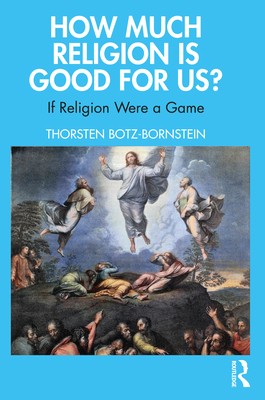
- We will send in 10–14 business days.
- Author: Thorsten Botz-Bornstein
- Publisher: Routledge
- ISBN-10: 1032615168
- ISBN-13: 9781032615165
- Format: 15.6 x 23.4 x 1.1 cm, minkšti viršeliai
- Language: English
- SAVE -10% with code: EXTRA
Reviews
Description
How Much Religion is Good for Us? is a provocative book which examines parallels between play and religion from a philosophical, theological, and anthropological perspective.
Understanding "religion as a game" in the context of secular culture, it explores the "playful" patterning of spiritual and religious belief in modern societies. Drawing on the Nietzschean concept of a dead but powerful God, the book depicts modern civilisations as players treading a secular age in which the spirit of religion unconsciously survives. It argues that the spirit of religion is preserved in cultures in the form of a spiritual game, distilling moral precepts and imperatives much like poetry and works of art do. Comparative in scope, it references Christianity, Buddhism, Islam, Sufism, and Daoism.
This interdisciplinary volume is an outstanding resource for students and scholars of Religious Studies, Islamic Studies, Cultural Studies, Philosophy, and Anthropology.
EXTRA 10 % discount with code: EXTRA
The promotion ends in 22d.09:05:50
The discount code is valid when purchasing from 10 €. Discounts do not stack.
- Author: Thorsten Botz-Bornstein
- Publisher: Routledge
- ISBN-10: 1032615168
- ISBN-13: 9781032615165
- Format: 15.6 x 23.4 x 1.1 cm, minkšti viršeliai
- Language: English English
How Much Religion is Good for Us? is a provocative book which examines parallels between play and religion from a philosophical, theological, and anthropological perspective.
Understanding "religion as a game" in the context of secular culture, it explores the "playful" patterning of spiritual and religious belief in modern societies. Drawing on the Nietzschean concept of a dead but powerful God, the book depicts modern civilisations as players treading a secular age in which the spirit of religion unconsciously survives. It argues that the spirit of religion is preserved in cultures in the form of a spiritual game, distilling moral precepts and imperatives much like poetry and works of art do. Comparative in scope, it references Christianity, Buddhism, Islam, Sufism, and Daoism.
This interdisciplinary volume is an outstanding resource for students and scholars of Religious Studies, Islamic Studies, Cultural Studies, Philosophy, and Anthropology.


Reviews